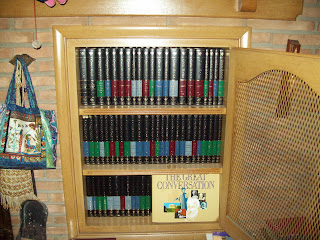
There’s really no good way to tell your friends that you’ve decided to start a ten year reading program and, what’s worse, that you both intend to write about the experience online but here we all are. Hi, we’re Rob and Kendra and we’re word nerds; so much so, that once gifted a set of sixty books purporting to represent the Western tradition of writing as well as any sixty-volume set might be able, that we couldn’t resist the almost ludicrous task of reading and writing about them.

Kendra and I both graduated from the University of Science and Arts of Oklahoma (USAO for the initiated), the state’s only publically funded liberal arts university. I think it’s safe to say that neither of us chose USAO specifically because of its liberal arts education style or could have articulated exactly what a liberal art might look like. If pressed, I might have tried to identify the Humanities as the liberal arts; liberal in the sense that they would really only prepare you to teach or write instead of doing something eventually profitable like accounting or working with computers. The best I could tell coming in, the biggest difference between USAO and other schools I had looked at was the emphasis that was placed on the interdisciplinary core (IDS) curriculum, required of every student regardless of their field of study. While every school had its own general education core requirements, USAO placed a lot of focus on the format of these classes; team taught by two professors from complementing disciplines with the focus progressively weighted towards expository writing as the means of assessing the our academic progress.
Independently determined to avoid the pitfalls of assured success, Kendra and I both chose English as our course of study without realizing the amazing leg up it would give us in the IDS core. In both the IDS core and classes in our major, we were essentially asked to read a metric butt ton of material and then write in response to it. By the time we finished, neither of us was particularly interested in joining the ranks of academia but we were decent writers, if by virtue of nothing but practice. Though, between us, we have held a wide range of jobs (musician, zookeeper/zoo management, retail and office management, archeology, comics writer, substitute teacher), that skill of being able to collect data, analyze and then synthesize it into a written response has benefited us at every turn.
When we received the Great Books of the Western World as a Christmas present in 2007 from Kendra’s father, it sparked something off inside that led us to reexamine our educational experiences from a new vantage point with a better appreciation for its value relative to other, equally capricious, educational decisions we could have made. Would knowing then what we know now have improved upon the education we received? The beauty of the liberal arts education is in its process, exposing students to the great writers while creating the necessity for that student to develop meaningful writing habits in response to the coursework.
Urged onward by a crushing ice storm that cut power to our house for five days, we began the reading program immediately, advancing in fits and spurts relative to the difficulty of the material assigned.

We stayed “on the wagon” for about six months before being defeated by Augustine and Rabelais respectively. For me, the reading without the response just didn’t have the same appeal and, despite out best efforts to discuss together what we had read, we found it difficult to keep those discussions organized in a way that ensured that we got to the essence of the work in question.
And so that is how we ended here, starting up a blog as the vehicle for writing in response to reading down the Ten Year Reading List for the Great Books of the Western World. The first draft of this entry was a really gloomy reading of the world we live in and offered this kind of continuing liberal arts education as an antidote for what ails us. Upon reflection, I felt kind of stupid suggesting reading better books and writing about them is any kind of curative against real world ills like poverty, disease, famine or global warming. If the house is burning down, by all means, grab a bucket of water before you grab a book about the history of fire fighting.
Equally, as we are confronted by a daunting set of challenges, some very old and some very new, we believe that now is not the time to jettison our understanding and appreciation of two and half millennia of writing that just might provide some of the answers we desperately need.
So once you and Kendra finish the reading the books, will you be able to participate in The Great Conversation? I too am reading the books as well. I have a set containing 54 books given to me by my Father too. I think it's a worthy endeavor and one that is needed in the 21st Century...Keep reading and writing...critical literacy is a loss Art in America.
ReplyDeleteWe'd like to think by blogging extensively as we are reading that we are already contributing to the Great Conversation. The goal, as you noted, is to raise awareness of the fundamental ideas that shape our culture. For the last seven months or so, we've been able to share our thoughts with over fifteen hundred different readers from countries all over the world. As those essays continue to pile up, we can only expect more folks to become aware. Thank you so much for reading!!
ReplyDelete